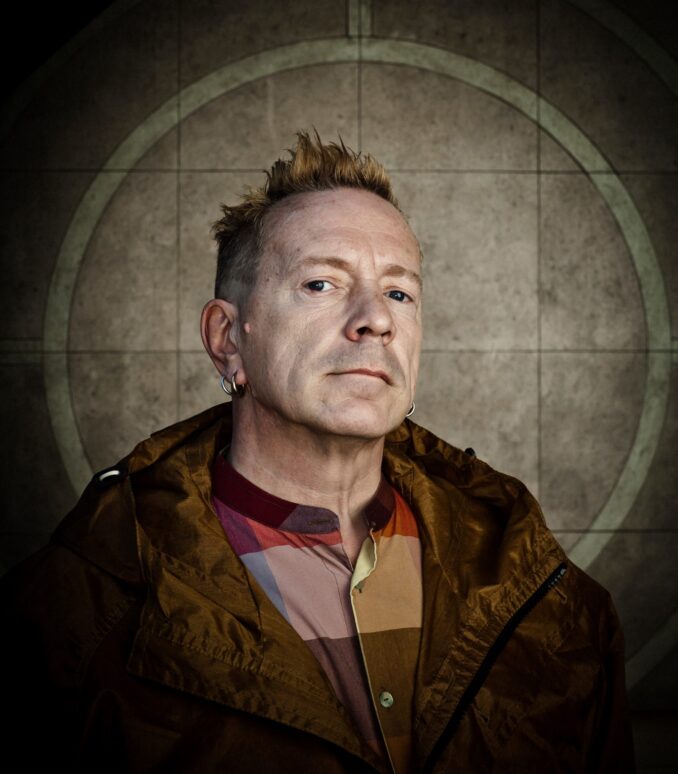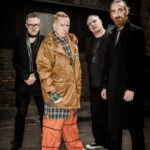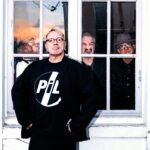
He burst onto the music scene in the mid ’70s and shook it to its very core as Johnny Rotten fronting the Sex Pistols. Now a little older and wiser he’s celebrating 40 years of Public Image Limited, the band he formed after the Pistols had crashed and burned. Mick Burgess caught up with a hugely jovial, witty and eloquent John Lydon to talk about 40 years of PiL, the celebratory tour, career spanning box set and the prospect of being knighted by the Queen of England.
In June will start your first UK tour in a couple of years. Are you looking forward to getting out there to perform again?
This will be the first time in years where I’ll actually be touring in the summer. It always seems to be around November and I’m really prone to flus, chills and ills so this’ll be a nice surprise to be 100% healthy. I won’t know what to do with that.
It’s a pretty long tour but it’s quite well paced with plenty of rest days in there. Do you now have that luxury of being able to plan your own tour so the days of 14 shows in 14 days are well and truly over?
Those aren’t rest days. They are days that we’ll be recording the new album. After each show we return to our studio in The Cotswolds and record between each show.
We actually have a very heavy year this year and will go to South America and North America later this year.
This tour marks your 40th anniversary since the formation of PiL. Did you ever dare think you’d be in a band that lasted 10 years let alone 40 years?
While we’re celebrating it’ll be complete hard work so there’s no time to rest on my laurels. I’m not the kind of person who would do that anyway. I’ve only done 40 years work and I owe everyone another 40 years.
Do you think the fact that you haven’t stood still musically and have continued to push the boundaries has kept the band fresh and relevant?
The deeper you go in and explore what emotions there are, which is what PiL does, the more and more strange and interesting things you find and that’s the key to the momentum and that is to explore then you can’t help but be original because you’re exploring your own mind.
How do you go about constructing a set list that celebrates a 40 year, 10 album history?
With great difficulty because you’re spoilt for choice. We’ll leave it until the last four days which is when we’ll rehearse and when we’ll know what we feel good about. It’s a last-minute decision and I think those tend to be the best because you do them under stress and I’m one of those war horses that works better under stress.
You did a cover of Zeppelin’s Kashmir for a while, which is a song that people probably wouldn’t expect you to do. Could you pull out a surprise cover on this tour?
The trouble with that was that the band played it lovely but I just couldn’t wrap my head around those lyrics so I couldn’t get into it at all. I thought I was turning into a Hippy. We did it as good fun and a certain nod and a wink of respect to Led Zeppelin who I love. We’re highly likely and capable of pulling another unusual cover out of the bag on this tour so you’ll have to wait and see what we do.
On 12th June you’re up in Newcastle. How have the Newcastle crowds treated you over the years?
Apologies to the people of Sunderland and Middlesbrough. I hope they can be Newcastle friendly for one night and come and see us in the one place. Newcastle is a very friendly place and has been very good to us over the years.
You’re back up in the region for the Hardwick festival in Durham on 19th August too. How will you vary your show from playing your own headliners set to playing out a festival with other bands?
The set has to alter because there’s the time difference and there’s lots of other issues to consider. Some of the more intimate songs which are up close and personal, eyeball to eyeball with the audience, can’t be done from a festival stage so the set will have to be altered for those shows. Maybe I should do a version of Hush Little Baby Don’t You Cry for them?
PiL has had a fluid line up over the years with just you being the one constant member. Has that been intentional to enable you to work with different musicians who are able to adapt to the direction that you are wanting to take the band in?
I’m not like Donald Trump. I’m not always hiring and firing, that’s just not my game. It was always record company pressure that kept splitting things up but because now we’re our own label, we have found a continuity and we do things for ourselves and the difference is overwhelmingly positive. There’s a very close bond between us and that’s always the way I always wanted it. There had been issues in the past that you had to endure and get through and you get where you need to be. I’ve learned over the years to have more patience than a hospital.
The present line up with Bruce Smith (drums), Lu Edmonds (guitar) and Scott Firth (Bass) has been together almost 10 years. This is probably the most stable line up you have. What is it about these three that is working so well for you?
These are my friends and we very, very much get on a personal level as well as a musical level.
Bruce and Lou go back with you to the mid ’80s. Where did you first come across them?
I knew them from other bands before and we always got on socially. For me, if you can connect socially, then it should be alright working together. The musicianship thing can come next. Anyone can learn anything really but if you’re a horrible person, forget it there’s no room for you. You live in close quarters when on tour and with the crew too all on one bus so there has to be a healthy bunch of people there. We treat being on tour like being a Viking raiding party bringing gifts but we’re not after your jewellery, we’re giving you music.
The record, Album, has one of the most intriguing collections of musicians of any album you’ve done and features Steve Vai, Ginger Baker, Bernie Worrel, Ryuichi Sakamoto and also the Soulful vocals of Bernard Fowler. How did you manage to get such a varied bunch of musicians onto your record?
I had my own band at the time but they were too young to cope with the studio pressures. We just got on the phone and rang around town and everybody was really, really willing. When I presented that record to Elektra they just dismissed it. I didn’t tell them who was on it and their attitude was just that this would never sell. In the first week it got into Billboard’s Top 80 which is a really high position in America, then they kicked me off the label. 20 minutes later I informed them who was on the record so they had effectively sacked Ginger Baker and all of those other great musicians as they were playing on the album. They thought the album wasn’t good enough so the next thing Elektra did was to invest in Metallica and we all know where that went. That was their big American dream. I had no problems with that band but this is how large record companies work. For me I thought that was a surprisingly excellent record and I think it should have been able to stand on its own without any names at all. That was just fun people having clever times.
What did you learn from them as an artist?
That I was capable of holding my own. I was being undermined by the label at every turn and it does stifle you and erode your confidence so for me that was a real eye and ear opener.
How was it working with Ginger Baker? He has a reputation of being quite difficult?
Fantastic. I got on with him really well. He was a complete lunatic. He reminded me of myself. Ginger Baker destroyed two drum kits within 20 minutes, he was that ferocious.
The band was put on hold in 1992. Did you feel the band had run its course at that point?
No, I didn’t. I didn’t want the band to stop. What happened was that the money was being withheld by the label again. They said I had overspent and until they had recouped they weren’t going to put another penny into me. So how can you recoup if you can’t tour? It was Catch 22 for me really. It went on for a decade and a half, it just didn’t make any sense. I had to claw my way out of that hence the butter campaign.
So the butter advert helped to resurrect PiL as a band?
It did as it meant I could make money towards the alleged debt. It meant that I could buy myself off that damned label and go independent and here I am today, thankyou Dairy Crest. I love British butter. It’s done me wonders.
I think it surprised a lot of people when you did that advert.
They were great people to work with. I’ll have nothing bad said against them. They were open to any idea I put down and that’s why that worked as a campaign. It was great fun. I needed it, I needed to get out from under the claw of corporate business.
You’ve released This is PiL and What The World Needs Now since getting back together. Was it important to you to create new music to stay relevant and not just go on the nostalgia circuit?
It’s a case of I’m really proud of this album, can’t wait to make the next. There were three years in between but it was three years well spent investing in the ideas. We improvise in the studio but there’s years of thought leading up to that precise moment. We’re such individuals that it can only be to the benefit of all of us. It’s those differences that make us better. There is always that desire to create so it is important for me to continue to make new music.
You made your name in the Sex Pistols and everybody expected you to continue as a Punk when they came to an end. Did you feel that you had to have a complete clean break from that and do something completely different?
Not deliberately so but I knew I wasn’t going to drive on repeating myself. My thought processes had changed. I thought the Pistols were a great cleaning house for me to attack institutions but I wasn’t going to do that for the rest of my life. In a weird way Public Image Limited was a soul-searching band to find out what was wrong with myself before blaming others. So, there it is. I’ve avoided all of the trappings of infamy and fortune. Well, the infamy came but not the fortune. I just tried to keep things as honest as I can and always bearing in mind the respect I had for my parent’s belief in me and my friends, my family and my country and my planet earth.
When you were in the middle of all of that with the Sex Pistols, the press were pretty vitriolic to you. What did your parents make of that?
My Mum and Dad got a Class A up close and personal example of it when the local newspaper, The Islington Gazette, came round to visit them to do an interview. They stole photos out of a photo album that my Mum had and wrote the nastiest piece against them. It was really spiteful and it was from that moment my Mum and Dad realised what I was up against. They also knew I was a difficult child, very independent and would go my own way. I’ve always been like that but I think that’s because I was recovering from very serious illnesses when I was young so I had to be independent.
What did they think of your music?
My parents had faith and trust in me. They were very proud of PiL and I’m proud that I wrote Death Disco about the imminent death of my mother at the time and I was really, really pleased that she liked it. She understood that I was screaming in agony at the thought of losing her. That was a very excellent moment to share in life. Doing that song live is the most meaningful for me. I’ll probably do it on this tour as it’s a song I just love to do. It’s so sad, but you fight the sadness and it’s different every night. The death of my father more recently is now included in those words. You have to come to terms with these things openly but it’s hard and I can see it out in the audience that they have those experiences too and it’s to all of our benefit to share that.
You only created one album with the Sex Pistols while you were together. Do you ever wonder what might have happened if you’d done a second album?
None of us expected anything out of it in the first place but the laughs and giggles quickly got subdued due to the overwhelming negative media and that was reflected in the general public who’d attack us physically. You get worn down with that and ask yourself what are we doing this for. It became nonsense and we were in a permanent state of defence over what, telling a few home truths. It was a good 10 years after the Pistols ended that people caught on to just how important and relevant we were.
Do you think having that one album where everything came together and then ending so quickly that it has kept that legend alive rather than going on forever like some bands have done?
We were trapped in our own delusion. I looked at it like this at the time, OK I’ve written the sentence and I’ve come to the full stop. I’ve been that way ever since. If a situation is too ugly to improve, just stop it and knock it on the head.
When you first burst onto the scene everyone said it was a reaction to the prevailing music at the time. What did you really think of the music around at back then?
I’m actually glad that people thought that at the time because it wasn’t really what we were doing it for. We were bored, there was nowhere to go and it was all big amphitheatre bands. There was no real local scene other than a couple of pub bands and we were all underage so even that was cut off to us. We were basically whipper-snappers trying to find our own entertainment. Culturally we had a really huge knock on effect.
When you met some of these musicians while you were on the road or in the studio away from the glare of the press did you tend to have some banter with them?
Just because I didn’t like someone’s music doesn’t mean I didn’t like them. I had really good mates amongst other bands like Def Leppard and even Keith Emerson from Emerson Lake and Palmer and the guys from Pink Floyd. I see no problems with us mixing socially. That’s really what friends are for. My best friends don’t agree with anything I have to say which is why they are my best friends. You are never bored with company that keeps you alert.
You really tapped into a whole movement at that time. Do you think that the timing was just right both musically and socially for you to strike a chord with the disaffected youth?
They were just instinctive responses to our frustrations. You have to remember at the time the unemployment, the marches, garbage cans all over the streets and the riots. This was our healthy backdrop. There we were disagreeing with each other on top of it and a manager who wanted to take credit for everything, like he invented the universe. Out of all of those dangerous moods, something healthy always comes out. That’s why I say about the great calamities of the word…..wait for the end of the sentence. We’re back to the full stop again.
Do you think the music today could do with a big shake up? Has it got too safe and sterile?
Will there be a new exciting youth movement now? I don’t know. I think the internet has turned people in on themselves and they have become awfully so self-absorbed. FaceTime and this Snap Chat thing are good electronic gadgets but it’s just a gimmick after all. If you want real friends, get out and meet people. The best place for that used to be record stores and gigs. They were always great social occasions. Complete strangers would become friends by offering you advice and information on bands and things. The social aspect is what’s missing. I can’t see anything arising that’s dead against that. If there’s to be any progress in the world we should look at that and say that we shouldn’t have allowed that to be taken off us. The only way the modern youth can mix and match is through stupid gang fights using knives. That’s how bad it’s got. They’ve got nothing, there’s nothing given to them. All they’re asking for is a little bit of attention and respect and you’ll see much better results. I used to be a play school teacher before The Pistols looking out for problem kids. If you kept them entertained, they grew up to be much better people. It doesn’t help when all of the youth clubs and community centres are closed down. Where do you learn to socialise? If you don’t learn to socialise, you become anti-social.
You created probably the biggest stir with God Save The Queen during the Silver Jubilee. Four decades on you’ve become something of a national treasure. Mick Jagger and Paul McCartney have been knighted. How would you feel if you got the call for a knighthood?
I think I’d say, thanks but no thanks. I’ve never asked for it, don’t need it and she might be a very angry old lady so I’ll not let her put a sword anywhere near my neck.
You were reintroduced to a lot of people who saw a different side to you on I’m A Celebrity Get Me Out Of here. What possessed you to put yourself through that ordeal?
Just the sheer devilry of it. They’d been asking me for years and I kept turning it down. I finally thought that there were a few charities out there that could do with the money. That’s what I did it for. One of the charities helped an albino monkey in Sri Lanka but I found out it died soon after. There was also a charity for orphanages that I wanted to help. I’m not looking for any grand awards for this, I do it on the quiet. You have to look after fellow humans. My Dad used to look after orphans when my Mum died but they stopped that when they found out that his son was Johnny Rotten.
Did the thought of all those creepy crawlies in the jungle not scare you?
I felt that beforehand but once there it was sink or swim so I just got on with it. My attitude was this was their house and I’m their guest and all I had to do was be polite and there it is.
How did it feel having Bart Simpson play you in The Simpsons?
I’ve done voice overs for cartoons and have done quite a lot of that so it was quite good fun for me to see Bart being me. It’s all good fun and I love cartoons.
Looking to the future, what’s next for PiL once this tour is over?
We have written some of the songs and we travel back between shows to record them. The principle is to use the raw energy of the live performance and try to instil that into the grooves of a record. That occurred to us on the last tour that we needed to do that, so we’re working on a new album but don’t know when that will be coming out as it’s still early days.
Have you got any other projects lined up?
There’s a documentary coming out that we’re trying to get into cinemas near the gigs. There’s also a box set celebrating 40 years so far including huge piles of music and 6 hours of film footage and it comes with a book to tell you the facts, the whole facts and nothing but the facts. They should be out in time for the tour. I’ll just end by saying peace and if you don’t believe in peace you can peace off.
Public Image Limited are on tour in the UK and Europe right now.
The Public Image Limited Is Rotten box set is out on 20th July
See pilofficial.com for more details.
Photos By Tomohiro Noritsune and Paul Heartfield







Be the first to comment